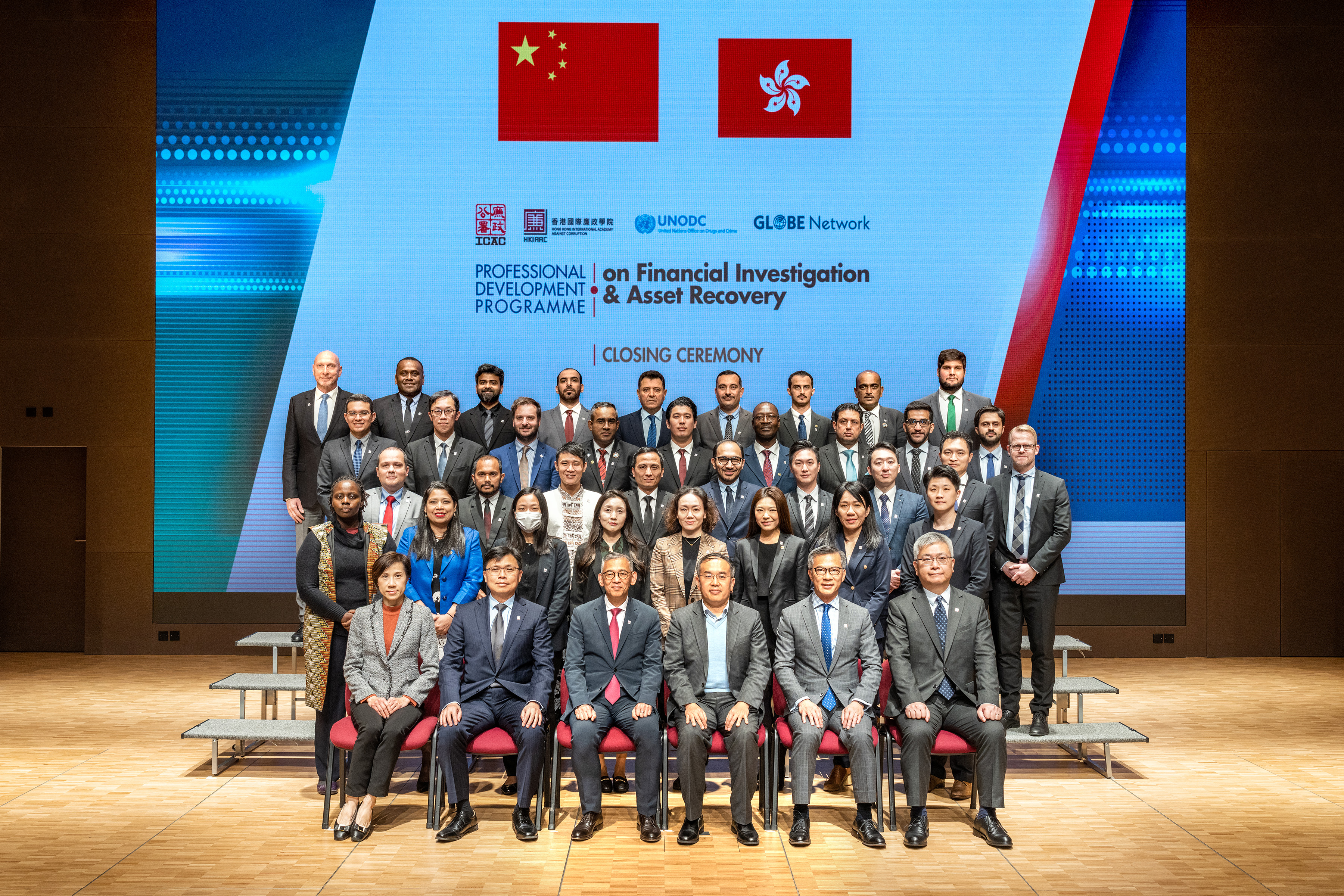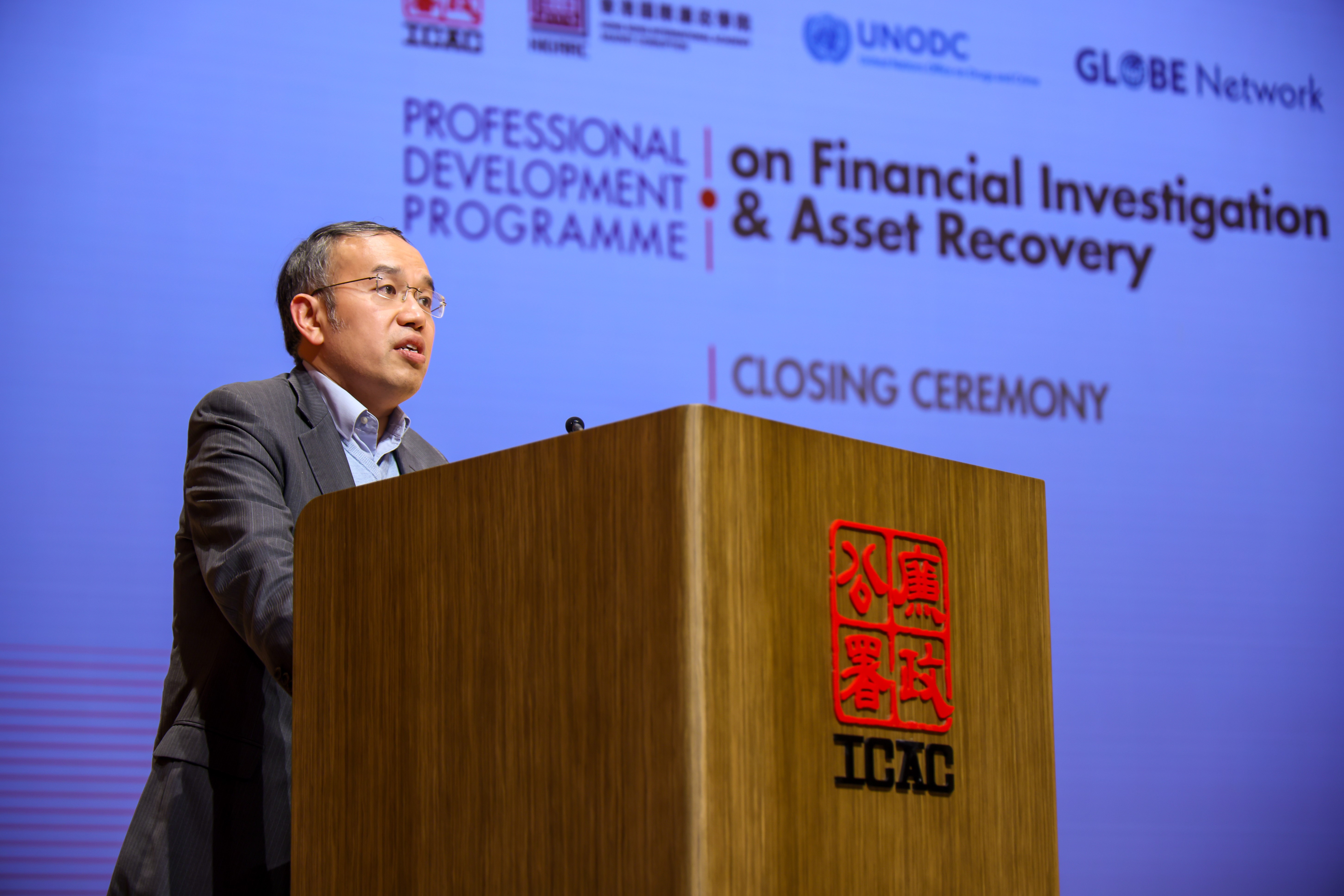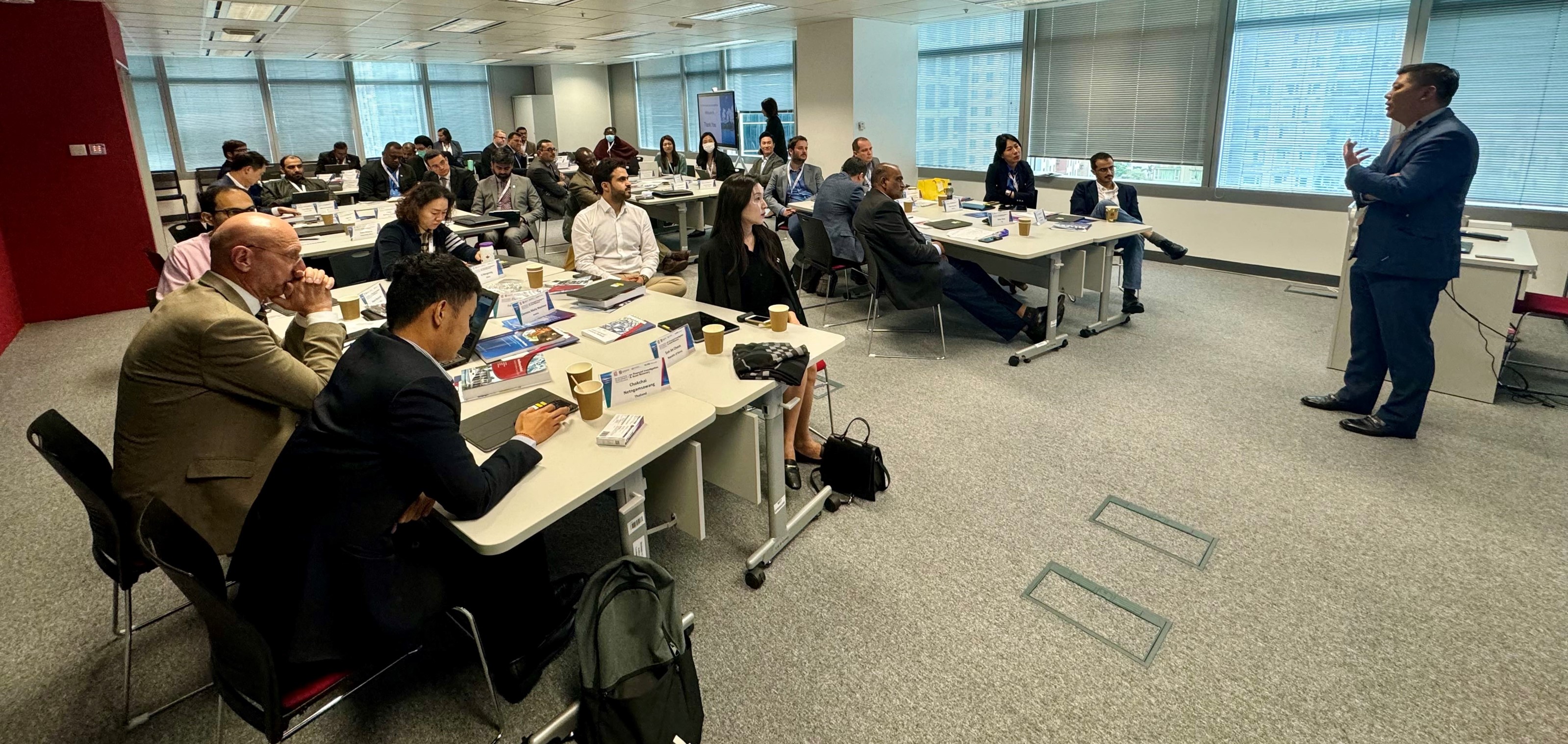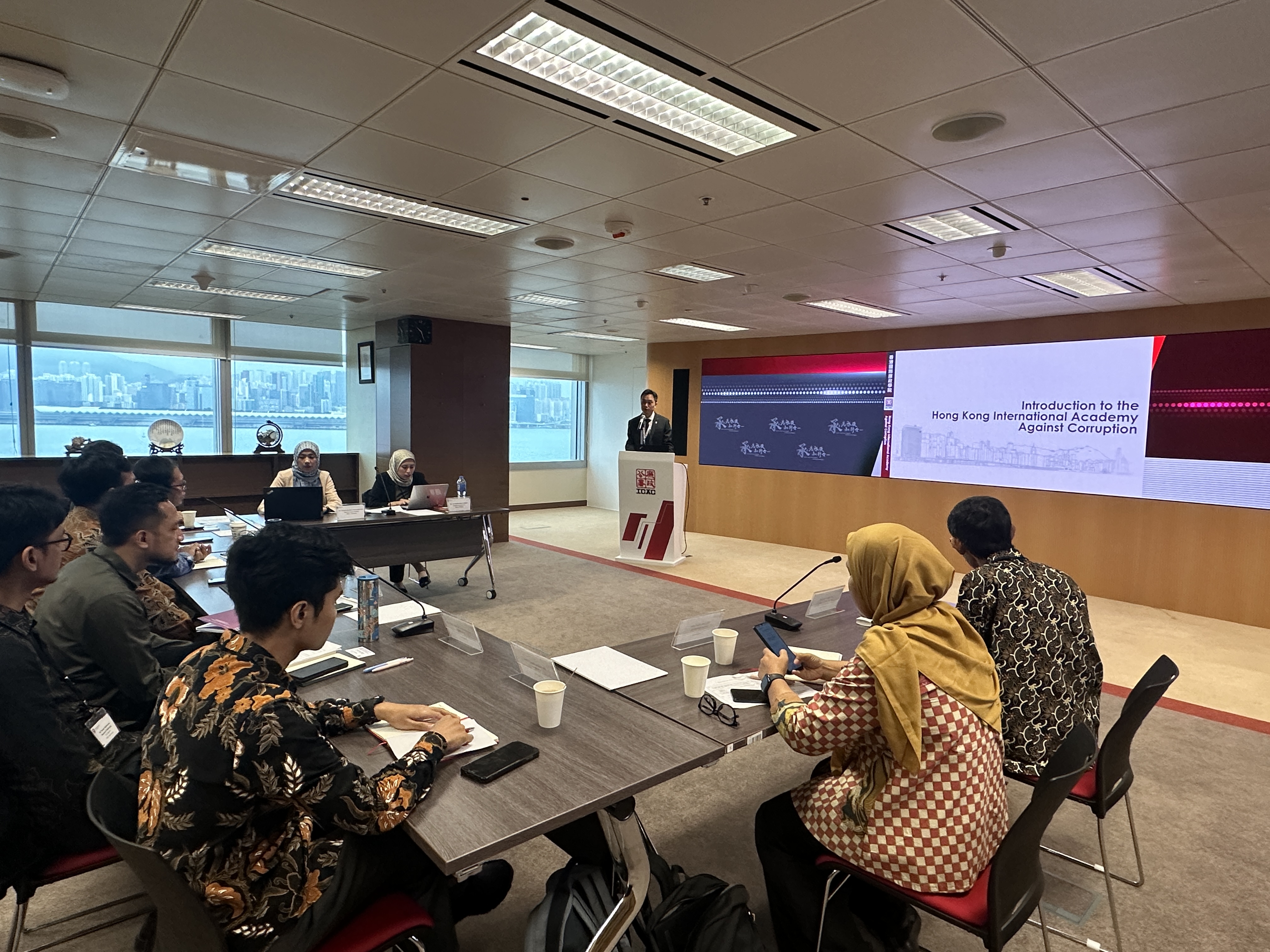Freshly minted HKIAAC brings together graft fighters from around the globe for sharing of financial investigation and asset recovery
2024-2-27
Thirty-five law enforcers from 19 jurisdictions around the world today (February 27) completed an international anti-corruption training programme co-organised by the ICAC and the United Nations Office on Drugs and Crime (UNODC), the first of its kind held in Hong Kong. The programme, which was the inaugural course of the Hong Kong International Academy Against Corruption (HKIAAC) newly established by the ICAC this month, attracted a record high number of participating countries and regions among past ICAC training events.
The nine-day Professional Development Programme on Financial Investigation and Asset Recovery, themed “Uniting the World to Combat Corruption in a New Era”, was co-organised by the HKIAAC and the UNODC’s Global Operational Network of Anti-Corruption Law Enforcement Authorities (GlobE Network). The Programme gathered graft fighters from law enforcement agencies which are GlobE Network members from different continents.
Speaking at the closing ceremony of the Programme, ICAC Commissioner Woo Ying-ming remarked that every jurisdiction had its unique challenges when carrying out financial investigation and asset recovery, and there was no one-size-fits-all approach. The Programme provided a platform for participants to learn from each other by sharing their experiences, challenges encountered and best practices developed.
Woo added that through organising professional training programmes, the HKIAAC hoped to share the ICAC’s graft-fighting experience accrued in the past five decades with its international counterparts and advance the global anti-corruption cause. The Programme, a testimony to the continuous cooperation between the ICAC and the UNODC in the anti-graft cause, aimed to promote networking among different jurisdictions and strengthen international anti-corruption collaborations.
Officiating guest of today’s ceremony Christopher Hui, Secretary for Financial Services and the Treasury, noted that the Programme underscored the importance of international cooperation in the realm of anti-corruption. He stressed that the Government remained steadfast in its commitment to combating corruption and fraud, ensuring that those malpractices did not compromise the integrity and credibility of the markets, which were essential to Hong Kong’s ongoing development efforts.
“We are fully committed to fostering closer cooperation with other jurisdictions to combat cross-border money laundering and terrorist financing activities. Our law enforcement agencies and the Department of Justice work closely with their global counterparts in respect of these enforcement, prosecution, mutual legal assistance, asset recovery and confiscation efforts,” Hui said.
Addressing participants at the opening ceremony of the Programme earlier, Deputy Commissioner and Head of Operations of the ICAC Ricky Yau Shu-chun noted that with the advancement in technology and globalisation, corruption had become more sophisticated and allowed criminals to conceal their ill-gotten gains. Hence, financial investigation played a crucial role to help law enforcement officers uncover illicit activities, identify perpetrators and recover their proceeds of crimes.
Brigitte Strobel-Shaw, Chief of Corruption and Economic Crime Branch of the UNODC, expressed her gratitude to the ICAC for co-organising the Programme and receiving the participants. She stressed that the format of the course was engaging beyond traditional methods with interactive case studies, shared experiences, discussions, hands-on exercises and visits to various organisations. She encouraged participants to bring the knowledge acquired in the Programme back home and share with their colleagues and international counterparts.
The Programme featured sharing sessions by senior ICAC forensic accountants and investigators of its Asset Recovery Office on the Commission’s expertise and experience in financial investigation and recovery of crime proceeds. The ICAC’s anti-graft strategy in safeguarding Hong Kong’s status as an international finance centre was also introduced to participants.
Other guest speakers included representatives from the UNODC, StAR Initiative, the Tsinghua University, the Fudan University and the Southern University of Science and Technology. Meanwhile, local speakers came from the Department of Justice, the Hong Kong Police Force, the Hong Kong Monetary Authority, the Securities and Futures Commission, the Hong Kong Jockey Club and The University of Hong Kong. Their presentations covered topics such as fighting against money laundering and cross-border financial crimes, as well as international collaborations and mutual legal assistance relating to assets recovery.
Participants also visited the facilities of the ICAC Building as well as other local law enforcement agencies and public bodies to deepen their understanding of the anti-corruption regime and the rule of law in Hong Kong. As arranged by the Hong Kong Tourism Board, they also visited local communities and learnt about Hong Kong’s latest development.
The Programme also featured a three-day study tour to the Guangdong-Hong Kong-Macao Greater Bay Area. Participants visited the National Commission of Supervision to learn about Mainland’s experience in fighting corruption and integrity building. Under the arrangement by the National Commission of Supervision, participants had the opportunity to meet with officials of the China Securities Regulatory Commission and the People’s Bank of China to learn about Mainland’s comprehensive regulatory mechanism of the financial sector. Visits to the Mainland’s leading listed enterprises were also arranged for participants to gain first-hand knowledge of the latest economic development of China.
Joining the Programme were 27 overseas participants from 16 jurisdictions, namely Burkina Faso and Kenya of Africa; India, Iraq, Korea, Malaysia, Maldives, Saudi Arabia, Thailand and Uzbekistan of Asia; Fiji of Oceania; Austria, Spain and Sweden of Europe; as well as Brazil and Panama of Central and South America.
Also attending the Programme were three Mainland and Macao officials from the National Commission of Supervision of China, and the Commission Against Corruption of Macao SAR. Locally, five participants completed the Programme, namely four ICAC officers and a law enforcer from the Hong Kong Police Force.





